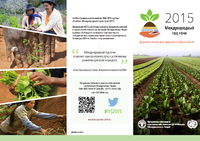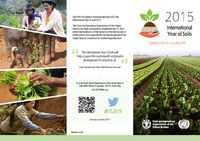Focal point
Location
The Food and Agriculture Organization of the United Nations leads international efforts to defeat hunger. Serving both developed and developing countries, FAO acts as a neutral forum where all nations meet as equals to negotiate agreements and debate policy. FAO is also a source of knowledge and information. We help developing countries and countries in transition modernize and improve agriculture, forestry and fisheries practices and ensure good nutrition for all. Since our founding in 1945, we have focused special attention on developing rural areas, home to 70 percent of the world's poor and hungry people.
Members:
Resources
Displaying 2116 - 2120 of 5074Международный год почв 2015, Здоровые почвы для здоровой жизни
2015 International Year of Soils
FAO Informative Material for the International Year of Soils (IYS 2015).
Review of the compatibility of sectoral laws with the right to food
Right to Food Handbooks 3. This handbook presents the process to be followed for the revision of sectoral legislation, since it may affect various aspects of the right to food. The purpose of this revision is to ensure that the legal framework of the country is favourable for the progressive realization of the right to food. The content of this handbook is based on the FAO's “Guide on Legislating for the Right to Food”.
Review of the compatibility of sectoral laws with the right to food
Right to Food Handbooks 3. This handbook presents the process to be followed for the revision of sectoral legislation, since it may affect various aspects of the right to food. The purpose of this revision is to ensure that the legal framework of the country is favourable for the progressive realization of the right to food. The content of this handbook is based on the FAO's “Guide on Legislating for the Right to Food”.
Review of the compatibility of sectoral laws with the right to food
Right to Food Handbooks 3. This handbook presents the process to be followed for the revision of sectoral legislation, since it may affect various aspects of the right to food. The purpose of this revision is to ensure that the legal framework of the country is favourable for the progressive realization of the right to food. The content of this handbook is based on the FAO's “Guide on Legislating for the Right to Food”.









